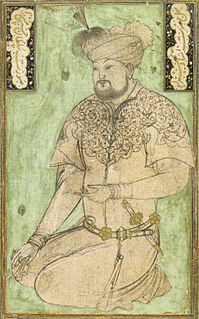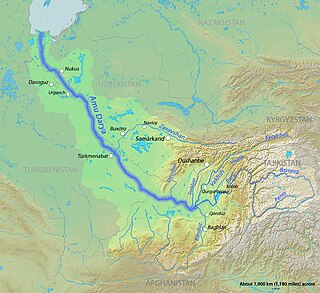
Mīrzā Muhammad Tāraghay bin Shāhrukh, better known as Ulugh Beg, was a Timurid sultan, as well as an astronomer and mathematician.

Shah Rukh was the ruler of the Timurid Empire between 1405 and 1447.

Sultan Husayn Bayqara Mirza was the Timurid ruler of Herat from 1469 until May 4, 1506, with a brief interruption in 1470.
Mirza Shah Mahmud was briefly a Timurid ruler of Herat. He was the son of Abul-Qasim Babur Mirza, who was a great-grandson of Timur. Shah Mahmud succeeded his father upon his death in 1457 at the age of eleven. Only a few weeks later, his cousin Ibrahim Mirza, a son of Ala al-Dawla Mirza, expelled him from Herat. Shah Mahmud failed to distinguish himself in the following years, and died sometime in the 1460s.
Ibrahim Mirza was a Timurid ruler of Herat in the fifteenth century. He was the son of Ala al-Dawla Mirza, a great-grandson of Timur.
Abdal-Latif Mirza was the great-grandson of Central Asian emperor Timur. He was the third son of Ulugh Beg, Timurid ruler of Transoxiana.

Ghiyath ud-din Baysunghur, commonly known as Baysonqor or Baysongor, Baysonghor or (incorrectly) as Baysunqar, also called Sultan Bāysonḡor Bahādor Khan was a prince from the house of Timurids. He was known as a patron of arts and architecture, the leading patron of the Persian miniature in Persia, commissioning the Baysonghor Shahnameh and other works, as well as being a prominent calligrapher.

Abu Sa'id Mirza was the ruler of the Timurid Empire during the mid-fifteenth century.
Abul-Qasim Babur Mirza, was a Timurid ruler in Khurasan (1449–1457). He was the son of Ghiyath-ud-din Baysunghur ibn Shah Rukh Mirza, and thus a great-grandson of Amir Timur.

With the death of Shah Rukh in 1447 began the long drawn out Second Timurid Succession Crisis. His only surviving heir was his son Ulugh Beg who was at that time viceroy of Central Asia at Samarkand. Gawhar Shad and Abdal-Latif Mirza were with Shah Rukh when he died on his way back to Khurasan from Iran. Abdal-Latif Mirza became the commander of his grandfather's army and in conjunction with his father Ulugh Beg began operations against his cousins. As soon as Ulugh Beg heard of his father's death, he mobilized his forces and reached Amu Darya in order to take Balkh from his nephews. Balkh belonged to Ulugh Beg's brother Muhammad Juki who died in 1444. Balkh was divided among his sons Mirza Muhammad Qasim and Mirza Abu Bakr. However, Mirza Abu Bakr took his older brothers' possessions when Shah Rukh Mirza died. Ulugh Beg summoned Abu Bakr to his court and promised him his daughter in marriage. But while there he had him convicted of plotting against him and imprisoned at Kok Serai in Samarkand where he was later executed. Ulugh Beg then marched on Balkh and took that province unopposed.
When Abdal-Latif Mirza reached Damghan, the prefect sealed the city and showed his opposition. After a skirmish and siege, the prince took the city by force and gave it over to general plunder. From Damghan, Abdal-Latif Mirza went to Bistam. At this city he learned of the progress made by Abul-Qasim Babur Mirza who had taken Jurjan and Mazandaran and thereby cut-off Abdal-Latif Mirza's path north to Samarkand. Abdul-Latif Mirza now had no choice but to move east arriving at Nishapur where he learned that Ala al-Dawla Mirza had taken Mashad. He was now completely encircled, he had nowhere to go. Finally he was attacked at Nishapur on 20 April 1447 by Ala al-Dawla Mirza's army and defeated.
During the Second Timurid Succession Crisis, the sons of Baysunghur; Ala al-Dawla Mirza and Abul-Qasim Babur Mirza had acted in cognizance and blocked Abdal-Latif Mirza's chances of uniting with his father Ulugh Beg. Abul-Qasim Babur Mirza had taken Mazandaran and Jurjan whereas Ala al-Dawla Mirza had taken Mashad thereby surrounding Abdal-Latif Mirza at Nishapur. On April 20, 1447, Ala al-Dawla Mirza's army surprised and attacked the city of Nishapur. Abdal-Latif Mirza was defeated and imprisoned whereas, Gawhar Shad and the Tarkhans were freed. They then marched towards Sadabad, Nishapur where Ala al-Dawla Mirza met Gawhar Shad and together they marched with the army towards Herat. At Herat, Abdal-Latif Mirza was kept in the fort of Iktiyar-al-Din. The army of Khurasan now marched against Ulugh Beg towards Samarkand.
After the Battle of Nishapur and the peace treaty which gave the Chechektu valley to Ala al-Dawla Mirza, he placed in that outpost a certain Mirza Saleh who was an enemy of Abdal-Latif Mirza. Furthermore, Ala-ud-Daulah Mirza kept hostages, certain men of importance, who were in the entourage of Abdal-Latif Mirza against the treaty. This forced Abdal-Latif Mirza's hand to take action which he did by attacking Mirza Saleh who then escaped to Herat. On this Ala al-Dawla Mirza marched from Herat with his army and besieged Balkh in the winter of 1447 C.E. Abdal-Latif Mirza sent a letter to his father Ulugh Beg for reinforcements. In response Ulugh Beg sent an envoy to Ala al-Dawla Mirza to admonish him and to let him know to address his grievances to Samarkand in the future rather than go to war. Finally, realizing his mistake Ala al-Dawla Mirza agreed to move his army back to Herat.
The Battle of Tarnab took place in 1448.

Abul-Qasim Babur Mirza, a Timurid ruler in Khorasan, invaded other parts of the region in the winter of 1448–1449 that were held by the Timurids of Samarkand, led by Ulugh Beg. Abdul-Qasim Babur Mirza was victorious and ruled over the area until his death in 1457.

It is not clear what led Abdal-Latif Mirza to revolt against his father Ulugh Beg in 1449 C.E. Many theories abound; one being that he was raised by Gawhar Shad in Herat and not by his father Ulugh Beg who was governor of Samarkand during the reign of Shah Rukh, therefore Abdal-Latif Mirza was not attached to his father. Ulugh Beg on the other hand preferred his second son Abdal-Aziz Mirza to be his heir, whom he had raised himself and groomed to take over. Another reason was that when the Baysonqor brothers invaded Khurasan, Ulugh Beg left his son Abdal-Latif Mirza, to deal with a difficult situation making it look as if it were his failures that led to the loss of Khurasan; this Abdal-Latif Mirza resented deeply. And finally, during a revolt in Balkh in Spring of 1449 by a certain Miranshah, which was crushed by Abdal-Latif Mirza, was discovered a letter from Ulugh Beg to this Miranshah ordering him to instigate the revolt. This story is not corroborated by any other source than Mirkhond but is given as a last excuse for all out war with his father. The real reason of this revolt may never be fully understood but Abdal-Latif Mirza marched in haste towards Samarkand after abolishing the state taxes on trade through Balkh and taking over the river boats on Amu Darya.

While Abul-Qasim Babur Mirza was away from Herat crushing the revolt of Amir Hendugha in Asterabad, Ala al-Dawla Mirza, his older brother, managed to escape from prison in Herat and went straight to his youngest brother Sultan Muhammad Mirza's province of Fars seeking his protection. Sultan Muhammad Mirza and Ala al-Dawla Mirza then marched with a large army and invaded Khurasan in 1449. This was the same time as the revolt of Abdal-Latif Mirza in Balkh against his father Ulugh Beg at Samarkand. While the father and son were busy facing off at the Amu Darya in the north, the Baysonqor brothers were about to engage in battle in Khurasan. Abul-Qasim Babur Mirza marched to face his brothers in battle and the two armies met at Farhadgerd. Sultan Muhammad Mirza and Ala al-Dawla Mirza defeated Abul-Qasim Babur Mirza who fled to the castle of Omad. Sultan Muhammad Mirza entered Herat and freed Ibrahim Mirza son of Ala al-Dawla Mirza. Abdal-Latif Mirza, who before the battle had sent an envoy to Abul-Qasim Babur Mirza professing peace during his revolt against his father Ulugh Beg, now congratulated Sultan Muhammad Mirza in taking Herat. But Sultan Muhammad Mirza was saddened by Ulugh Beg's defeat at Dimishq and his murder en route to Makkah by his son; however, he decided not to pursue a war in Transoxiana and instead wanted to concentrate on his holdings in Iraq-i-Ajam, Fars and now Khurasan as well.
Rukn-ud-din Ala al-Dawla Mirza, also spelt Ala ud-Dawla and Ala ud-Daula, was a Timurid prince and a grandson of the Central Asian ruler Shah Rukh. Following his grandfather's death, Ala al-Dawla became embroiled in the ensuing succession struggle. Though he initially possessed a strategic advantage, he was eventually overtaken by his more successful rivals. Ala al-Dawla died in exile after numerous failed attempts to gain the throne.
Muhammad Juki Mirza was a Timurid prince and a son of the Central Asian ruler Shah Rukh. He served as one of his father's military commanders and may have been favoured as his preferred successor. However, he died of illness in 1445, predeceasing Shah Rukh by two years.

The Gawhar Shad Mausoleum, also known as the Tomb of Baysunghur, is an Islamic burial structure located in what is now Herat, Afghanistan. Built in the 15th century, the structure served as a royal tomb for members of the Timurid dynasty and is part of the Musalla Complex.








